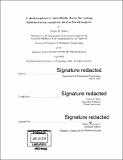A dielectrophoretic, microfluidic device for sorting lipid-producing organisms used as bio-oil sources
Author(s)
Schor, Alisha R. (Alisha Robin)
DownloadFull printable version (26.59Mb)
Other Contributors
Massachusetts Institute of Technology. Department of Mechanical Engineering.
Advisor
Cullen R. Buie.
Terms of use
Metadata
Show full item recordAbstract
In this thesis, we present a microfluidic screening device for selecting high-lipid-content cells from a heterogeneous population. The device utilizes dielectrophoresis (DEP) to simultaneously sense and sort individual cells based on their internal lipid content. Microorganisms such as yeast, algae, and bacteria produce high fractions of neutral lipids as part of normal metabolism, and are being explored as a hydrocarbon source for products such as biodiesel, nutraceuticals, and more. Thus, there is a global effort to select or genetically engineer microorganisms that produce higher proportions of lipids. Currently, screening is a laborious process and one of the primary bottlenecks to commercialization. Our cell sorter consists of an array of 105, 25-pim-wide gold microposts that span the height of a 15-[mu]m channel. The electrodes were constructed by a low current electroplating process, allowing for extremely rapid metal deposition. At 100 [mu]A, electroplating proceeds at 3.38 0.63 [mu]m/min, creating our structures in fewer than 15 minutes. This is an order of magnitude improvement over previous related methods. We are able separate high and low lipid phenotypes of the oleaginous yeast Yarrowia lipolytica using a 250 MHz, 2.6 Vp) signal in our device. Purity of the low lipid streams and high lipid streams are 98% and 71%, respectively. The high lipid stream purity can be improved by adjusting the spacing of the array. This work provides a method for label-free detection and sorting of cells based on their internal lipid content. This unique protocol for the rapid fabrication of 3D microstructures has enabled the creation of a non-invasive sorting tool for genetically engineered, lipid producing organisms. The ability to screen organisms based on lipid content will alleviate one of the major bottlenecks in conunercialization of microbial biofuels and other bio-oil products. Thesis Supervisor
Description
Thesis: Ph. D., Massachusetts Institute of Technology, Department of Mechanical Engineering, 2016. Cataloged from PDF version of thesis. Includes bibliographical references (pages 173-182).
Date issued
2016Department
Massachusetts Institute of Technology. Department of Mechanical EngineeringPublisher
Massachusetts Institute of Technology
Keywords
Mechanical Engineering.